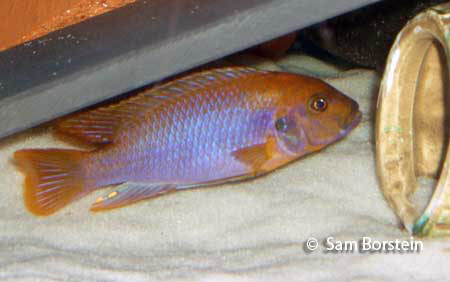Iodotropheus sprengerae
Oliver & Loiselle, 1972
Rusty Cichlid, Lavender Mbuna


Above: A male Rusty Cichlid. Photo by Sam Borstein.
Etymology:
Genus- Iodo= iodine like or rusty (Greek), Tropheus= nurture, as in the mouthbrooding done by cichlids(Greek).
Species- sprengerae= from stagnant water (Greek).
Intro:
Iodotropheus sprengerae is an old fish in the hobby. Being described in 1972 by Oliver and Loiselle, this fish is a classic. Although the word rusty does not seem like it would depict this fish as colorful, adult males if kept with proper care have a beautiful purple sheen to them. Out of the two species of Iodotropheus, the Rusty Cichlid is the only one that is somewhat available in the hobby.
Distribution:
Iodotropheus sprengerae is associated with rocks and is found at Boadzulu and Chinyankwazi Islands in Lake Malawi. There is debate over if the Boadzulu variant is a separate species or not (Konings, 2007).
Size, Maturity, and Sexual Dimorphism:
Size: Males- 4.5 inches, Females- 4 inches
Maturity: 2 inches
Sexual Dimorphism: Sexing Rusty Cichlids can be difficult. Males are larger than females, have more pronounced egg spots than females, and more of a purple tinge to them.
Care:
Rusty Cichlids are very hardy and easy to keep. Like all Malawian cichlids, it hard water and temperatures of 76 to 80F is optimal.
Iodotropheus sprengerae is very peaceful for an mbuna. A group of 6-8 adults could easily be kept in a 40 gallon breeder, with very few issues. It can also be kept with some of the more peaceful Malawians with no problem. The only time I observed aggression in this fish was during spawning, but even then, it was very minimal.
Diet:
This fish is an alagae picker, but will do okay if fed some food higher in protein. Keep the fish on a mostly fiber rich diet. I fed mine HBH graze, Dianichi Veggie deluxe, Spectrum, and baby brine shrimp.
Breeding:
Rusty Cichlids are suppose to be easy to breed. I know many people who had no problem breeding these fish. I, sadly am not one of those people. My story with Rusty Cichlids goes back to the November 2005 OCA Extravaganza.
At the OCA when I saw Iodotropheus sprengerae available, I knew I had to buy them. For one, there were not any in Illinois that were for sale, and in general this once popular fish seemed to disappear. I bought 8 Rusty juvies thinking that way, I would get at least one of each sex (a good habit to practice if you try to breed fish). The fish were small, but within 4 months started breeding. The first spawns were not fertile, but I was not surprised because the fish were young. After about 8 spawns, I was getting ticked off. I was watching these fish spawn, they would hold for 3 days, and then drop. I eventually tried stripping these fish, and the eggs would go bad within 24 hours. Almost everyone who knows me knows that my patience level is really low, especially when it comes to breeding fish. One day when I was viewing my tank where the Rustys were, I noticed that none were eating. All 8 of my Rusty cichlids were holding, which is not right, because this fish is not a bi-parental mouth brooder. These fish were all females. Unable to obtain a male Rusty, I had to sell the group.
Chapter 2 begins in September of 2006 at a GCCA Cichlid Swap Meet. I purchased a bag of six full grown Iodotropheus sprengerae. It took me a while to get the fish a permanent home, as they bounced from tank to tank. I finally settled the group in my 58 with some West Africans. Everything in the tank was fine except the Rusty Cichlids would not breed. It was 4 months and still nothing, and by now they should have spawned. It looked like this time I had all males. Now I'm extremely pissed, and due to my low patience level these fish were about to get the boot. Luckily this story has a happy ending. On the eve of the night the fish were to be shipped out to a friend of mine in Texas, they spawned. I wound up with out of the 6 fish one female.
Rusty Cichlids are pretty good holders. Mine held for 18 days before I striped her. At this point the fry were free swimming. Be careful when raising these fish as baby brine tends to give these fry digestive issues.
Conclusion:
Iodotropheus sprengerae is a great fish to keep. Not only is it peaceful and pretty, but it is easy to keep. This is a good beginner cichlid, if you can find them. In the mid-late 90's this fish was very popular, but now they are kind of difficult to find. Occasionally they will pop up in a pet shop. If you see this fish available, be sure to pick it up.
References:
- IUCN. IUCN Red List of Threatened Species. <http://www.iucnredlist.org>.
- Konings, A. (2007) Malawi cichlids in their natural habitat. 4th ed., Cichlid Press, El Paso, Texas, 424 pp.
- Oliver, Michael K. & P. V. Loiselle. (1972). A New Genus and Species of Cichlid of the Mbuna Group (Pisces: Cichlidae) from Lake Malawi. Revue de Zoologie et Botanique Africaines, 85, 309-320.
